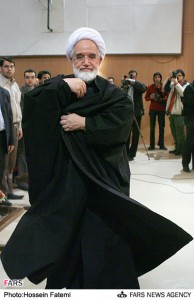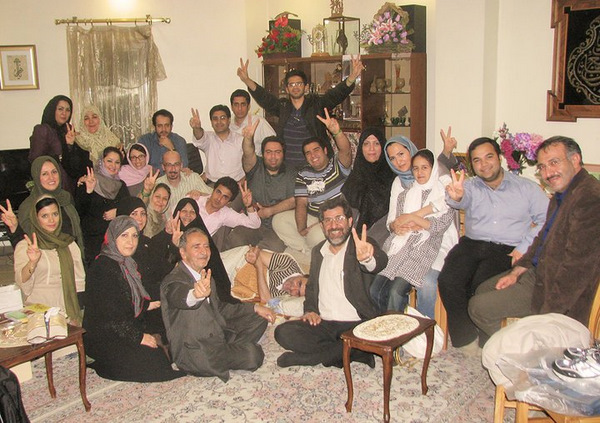The Latest from Iran (27 April): An Opposition Wave?
 Tuesday, April 27, 2010 at 18:48
Tuesday, April 27, 2010 at 18:48  1840 GMT: The Uranium Squeeze. Time magazine notices a key point that we've mentioned for some time, "Iran's need to find fresh supplies of raw uranium supplies is increasingly urgent, according to some reports."
1840 GMT: The Uranium Squeeze. Time magazine notices a key point that we've mentioned for some time, "Iran's need to find fresh supplies of raw uranium supplies is increasingly urgent, according to some reports."1830 GMT: The Oil Squeeze (cont.). Following the announcement by major French firm Total that it will pull out of Iran if US sanctions proceed and the defiant stance of Iranian officials that absolutely nothing was wrong with energy supplies --- see 0540 and 1050 GMT), Italian company Eni says it is "working on handing over the operatorship of the Iranian Darquain oil field to local partners".
NEW Iran’s Detained Journalists: EA’s (Vicarious) Confrontation with Foreign Minister Mottaki
NEW Latest Iran Video: Mousavi & Karroubi Meet (26 April)
Iran Document: Mehdi Karroubi “We Will Make The Nation Victorious”
Iran: The Mousavi 4-Point Message “Who Defends the Islamic Republic?"
Iran Exclusive: A Birthday Message to Detained Journalist Baghi from His Daughter
The Latest from Iran (26 April): Points of View
1700 GMT: Impact. We've known for days that opposition figures have been building up their challenge to the Government, but it's today, with the revelation of the meeting between Mir Hossein Mousavi and Mehdi Karroubi on Monday, that you know the wave has hit.
For the first time in weeks, the non-Iranian mainstream media is taking notice of the opposition as more than a post-11 February blip. Reuters headlines, "Iran opposition urges vote anniversary rally"; CNN, who established an "Iran Desk" for the 22 Bahman (11 February) demonstration and soon let it lapse, follows suit: "Iranian opposition candidates call for renewed protests".
1125 GMT: No Further Comment Necessary. From Press TV: "Deputy Foreign Minister Hassan Qashqavi said that it is 'ridiculous' to place limitations on the peaceful use of nuclear energy by making 'unfounded' claims about human rights and freedom of women."
1050 GMT: All is Well Update. Despite the accumulating news of a possible oil squeeze on Tehran with foreign producers withdrawing imports, the Government line is No Problem:
Iran says its strategic gasoline reserves have climbed by a billion liters, reiterating that sanctions on gasoline sales to Iran will never materialize.
"Iran is not worried about (possible) gasoline sanctions," Deputy Oil Minister Noureddin Shahnazi-Zadeh told Iran's Mehr News Agency on Tuesday, adding that sanctions on gasoline sales to Iran will never occur as there is no possibility of imposing such sanctions under current conditions.
1045 GMT: We have posted a short video from Monday's meeting between Mir Hossein Mousavi and Mehdi Karroubi, in which the two agreed to call a demonstration for 12 June, the anniversary of the election.
We have also posted a feature of how EA's list of detained Iranian journalists may have made its way into an Austrian newspaper's interview of Foreign Minister Manouchehr Mottaki.
0835 GMT: British Deportation. Last week, we reported on the British Government's plan to deport Bita Ghaedi, an Iranian woman who fled the country because of alleged abuse by her father and brother. Ghaedi was being returned to Tehran despite the likelihood that she would face punishment because of her participation in a rally protesting conflict over Iraq' s Camp Ashraf, home to many members of the People's Mojahedin Organisation of Iran.
Volcanic ash intervened to prevent Ghaedi's flight last week; however, her deportation has now been rescheduled for 5 May.
0830 GMT: Political Prisoner Watch. Farid Taheri, a member of the Freedom Movement of Iran, has been sentenced to three years in prison.
0750 GMT: Labour Watch. A collection of Iranian unions have issued a joint 15-point statement for May Day, "strongly supporting the demands of teachers, nurses, and other working classes of society to end discrimination".
Member of Parliament Alireza Mahjoub has criticised the Government's failure to implement rises in pensions and the hidden discrimination against female workers.
0740 GMT: Women's Rights Corner. Member of Parliament Ali Motahari has harshly criticised the "feminist and anti-family" views of Faezeh Hashemi, the daughter of former President Hashemi Rafsanjani. Motahari said that Hashemi's critique of polygamy was misguided, as the prohibition of polygamy would lead to prostitution.
0715 GMT: Political Prisoner Watch. Amidst reports of the poor health of many detainees, reformist member of Parliament Mostafa Kavakebian has insisted that a Majlis commission investigate the prisons.
0710 GMT: A Successful Protest. The sit-in of female detainees at Evin Prison has forced authorities to establish the separation of men and women in the facility.
0700 GMT: Corruption Watch. Green Voice of Freedom has repeated the claim that the Supreme Leader has insisted the corruption case against First Vice President Mohammad Reza Rahimi must be dropped because of "sensitive issues of nezam (the Iranian system)".
0640 GMT: We Persist. The Islamic Iran Participation Front has issued a protest against the recommendation of Parliament's Article 10 Commission that the reformist party be suspended. The IIPF declares that it will continue its activities.
The protest is signed by Mohsen Safai-Farahani, who was recently handed a six-year prison sentence.
0630 GMT: More Challenges. From the conservative side, leading member of Parliament Ahmad Tavakoli has said that the number and impudence of corrupt high-level officials have risen. He insisted that these officials must be confronted, no matter where and who they serve.
And reformist Ahmad Shirzad has asserted that the opposition movement has been bolstered by the addition of "dissatisfied hardliners".
0540 GMT: Monday was notable for the rush of opposition challenges to the Government. There was Mehdi Karroubi on a law-abiding, Constitution-promoting resistance that would bring victory to Iran, Mir Hossein Mousavi's "Who Defends the Islamic Republic?", and Zahra Rahnavard calling for the release of detained workers and teachers.
Of course, the important leap will be from statement to action. Yet it is striking this moment to compare the renewed calls for justice and freedom with the Government's rhetorical flourishes.
There was President Ahmadinejad again looking outside Iran with his promotion of the "satanic tools" of the United Nations and the US. There was Foreign Minister Mottaki, confronted with a list of more than 100 detained journalists and political analysts, replying brusquely, "Stick to the nuclear issue."
And there were apparent flights of desperation. As the chief executive of the French oil company Total was announcing that it would pull out of Iran if US sanctions proceeded, the deputy head of Iran's oil industry, Hojatollah Ghanimi-Fard, proclamed, "Iran has negotiated development projects with several foreign oil companies, including French concerns."
Ghanimi-Fard's optimism contrasted sharply with a statement from the Revolutionary Guard that it was prepared to replace Total and Royal Dutch Shell in oil and natural gas projects. Ali Vakili, the managing director of the Pars Oil and Gas Company, said a one-week ultimatum had been given to Shell and Spanish company Repsol, “We will not delay the development of South Pars phases waiting for foreign companies.”
 Ahmad Shirzad,
Ahmad Shirzad,  Ahmad Tavakoli,
Ahmad Tavakoli,  Ali Motahari,
Ali Motahari,  Ali Vakili,
Ali Vakili,  Alireza Mahjoub,
Alireza Mahjoub,  Ayatollah Ali Khamenei,
Ayatollah Ali Khamenei,  Bita Ghaedi,
Bita Ghaedi,  Britain,
Britain,  Eni,
Eni,  Evin Prison,
Evin Prison,  Faezeh Hashemi,
Faezeh Hashemi,  Farid Taheri,
Farid Taheri,  Green Voice of Freedom,
Green Voice of Freedom,  Hashemi Rafsanjani,
Hashemi Rafsanjani,  Hassan Qashqavi,
Hassan Qashqavi,  Hojatollah Ghanimi-Fard,
Hojatollah Ghanimi-Fard,  Iran,
Iran,  Iran Elections 2009,
Iran Elections 2009,  Islamic Revolution Guard Corps,
Islamic Revolution Guard Corps,  Italy,
Italy,  Manouchehr Mottaki,
Manouchehr Mottaki,  Mehdi Karroubi,
Mehdi Karroubi,  Mehr News Agency,
Mehr News Agency,  Mir Hossein Mousavi,
Mir Hossein Mousavi,  Mohammad Reza Rahimi,
Mohammad Reza Rahimi,  Mostafa Kavakebian,
Mostafa Kavakebian,  Noureddin Shahnazi-Zadeh,
Noureddin Shahnazi-Zadeh,  People's Mojahedin Organisation of Iraq,
People's Mojahedin Organisation of Iraq,  Press TV,
Press TV,  Repsol,
Repsol,  Royal Dutch Shell,
Royal Dutch Shell,  Time Magazine,
Time Magazine,  Total,
Total,  Zahra Rahnavard in
Zahra Rahnavard in  Middle East & Iran
Middle East & Iran 



